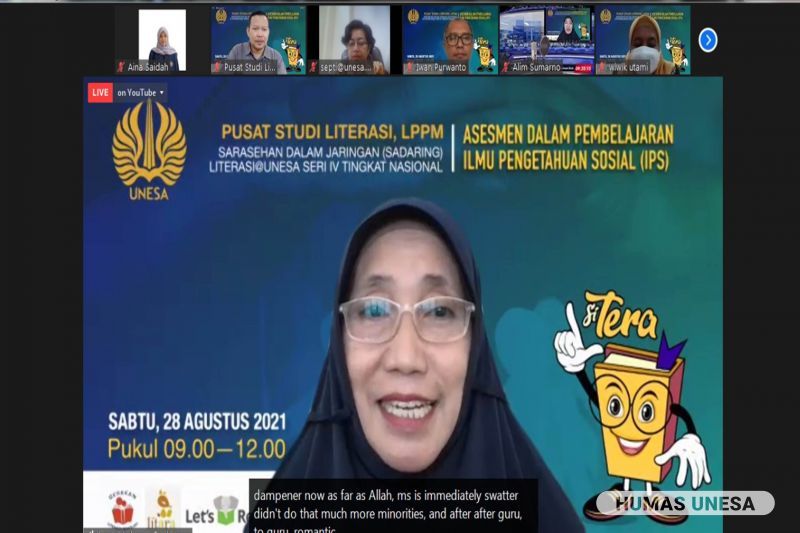
www.unesa.ac.id
Unesa.ac.id, SURABAYA-In order to improve the implementation of the Minimum Competency Assessment (AKM) system, the LPPM Literacy Study Center, State University of Surabaya held a series IV National Online Seminar (Awareness). The theme carried is 'Assessment in Social Science Learning (IPS)' through a zoom meeting conference on Saturday (28/08/2021)
This activity brought three speakers; Dr. Iwan Purwanto, M.Pd. as Lecturer of FITK UIN Syarif Hidayatullah Jakarta, and Dra. Wiwik Sri Utami, M.P. and Dr. Nuansa Bayu Segara, M.Pd. Both are Lecturers of FISH UNESA.
Vice Chancellor for Student Affairs and Alumni, Dr. Agus Hariyanto, M.Kes opened the event as well as giving a speech explaining that assessment is a benchmark for the success of educators, both teachers, lecturers, guides, instructors, and so on to measure process evaluation data or reflections and efforts to control education quality.
Currently AKM is a part of the national program of the Ministry of Education and Culture of the Republic of Indonesia to deliver the results of the minimum competence of students after studying in one subject, so that students can be independent, think critically, logically, systematically, understand concepts and knowledge in everyday life in the era of society. 5.0.
AKM IPS is an important part for students because it supports the development of students to interact creatively, positively, in the family and in the surrounding community. "Therefore, it is hoped that this activity can improve the quality of teaching and learning as educators so that they are able to prepare prospective Indonesian golden generations, although it is not easy because collaboration from various parties and various fields is needed," he said.
Dr. Iwan Purwanto, M.Pd. conveying the basic concepts and characteristics of social studies learning, he explained that the function of social studies in education is to equip students with knowledge, skills, and social values that are useful for their future, as good and responsible individuals in realizing the goals of national education. Meanwhile, for the purpose of social studies as a subject itself to understand social science concepts related to people's lives.
On that occasion, he also said that there are 4 social literacy skills, namely intellectual skills, social skills, cooperative skills and attitudes, and knowledge of social values (Jarolimek). The existence of the covid-19 pandemic, the industrial revolution 4.0, society 5.0, the digital era, and the emergence of artificial intelligence have caused massive changes in the order of life. "For that we need new literacy, including data literacy, technological literacy, and human literacy," he said.
Dr. Nuansa Bayu Segara, M.Pd. explain the material of innovative social studies learning model, adaptation of social studies learning to AKM. He said that social studies education was responsible for contributing to the follow-up process based on the results of the AKM. For this reason, it is necessary to adjust learning in the classroom to the characteristics of AKM.
The recommended model is an adaptive and innovative model for AKM applications such as the LOK-R learning model, this is because the LOK-R model is very flexible and can be combined with various strategies and this model is still in the development stage and continues to be perfected. "Every teacher has the opportunity to develop learning models, the most important thing is to follow the right research procedures," he added.
Dra. Wiwik Sri Utami, M.P. also said that in 2021 the change in the national assessment system would no longer be a national exam, but a Minimum Competency Assessment (AKM) as well as a character survey and a study environment survey. There are two basic competencies measured by AKM, namely reading literacy and mathematical literacy (numbering).
Furthermore, he explained that there were stimulus questions based on AKM, including in the form of text (can be a combination of: symbols, phrases, sentences, pictures or photos, graphics, tables), meeting the criteria for a good level of readability and quality in terms of content, language, and presentation. , can be used to measure and develop critical thinking skills in problem solving, communication, creativity, innovation and collaboration. AKM literacy reading materials can cover 3 contexts, namely personal, socio-cultural, and scientific contexts. (Aida/zam)
Share It On:






